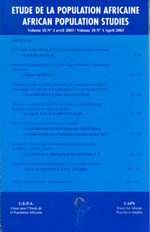
|
African Population Studies
Union for African Population Studies
ISSN: 0850-5780
Vol. 28, No. 2s, 2014, pp. 946-955
|
 Bioline Code: ep14040
Bioline Code: ep14040
Full paper language: English
Document type: Research Article
Document available free of charge
|
|
|
African Population Studies, Vol. 28, No. 2s, 2014, pp. 946-955
| en |
Socioeconomic correlates and the choice of treatment for childhood fever in Ghana
Arthur, Eric
Abstract
The study investigated the effect of household socioeconomic factors on the choice of treatment for childhood fever among children under age five in Ghana. Data from the 2008 Ghana Demographic and Health survey was used employing the multinomial probit model. Three treatment choices were considered: Government facility, Private facility and traditional/self-medication. The results suggest that the treatment of childhood fever is related to household wealth, health insurance status and residence. Government health facilities are mostly used by household's with higher wealth and household's with health insurance. Rural households are more likely to use traditional/self-medication, except those with health insurance who use government facilities. The age of the mother and birth order of the child were also found to influence the choice of treatment facility for childhood fever.
Keywords
Fever; socioeconomic; childhood; treatment; health
|
| |
| fr |
Arthur, Eric
Résumé
Cette étude analyse l'effet des facteurs socio-économiques des ménages sur le choix du traitement de la
fièvre chez les enfants de moins de cinq ans au Ghana. Les données de l'enquête démographique et de santé
du Ghana sont analysées à l'aide d'un modèle probit multinomial. Trois moyens de traitements ont été
considérés: public, privé, traditionnel/auto médication. Les résultats suggèrent que le traitement de la fièvre
chez l'enfant est lié au niveau de revenu des ménages, au fait qu'ils aient une assurance santé ou pas et à
leur milieu de résidence. Les établissements de santé publics sont principalement utilisés par les ménages
ayant un niveau de revenu élevé et par les ménages ayant une assurance santé. Les ménages ruraux sont plus
susceptibles d'utiliser des médicaments traditionnels ou de recourir à l'automédication, sauf ceux avec une
assurance santé qui utilisent les établissements de santé publics. L'âge de la mère et l'ordre de naissance de
l'enfant affectent également le choix du moyen de traitement.
Mots Clés
Fièvre, socio-économique, enfance, traitement, santé
|
| |
© Copyright 2014 - African Population Studies
Alternative site location: http://www.uaps-uepa.org
|
|
